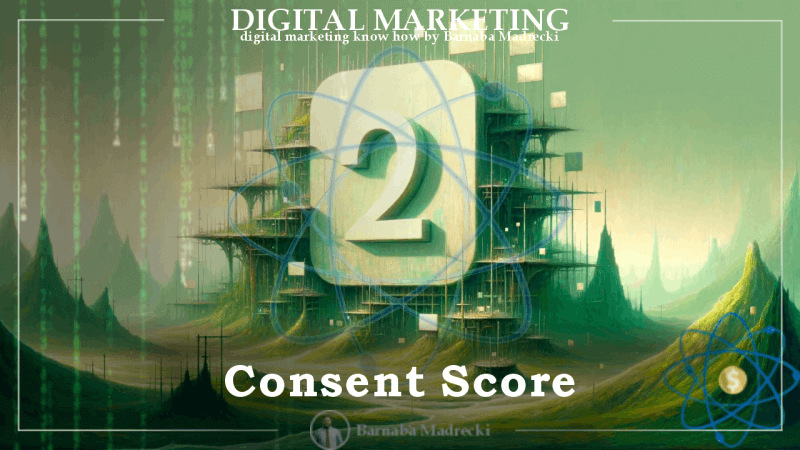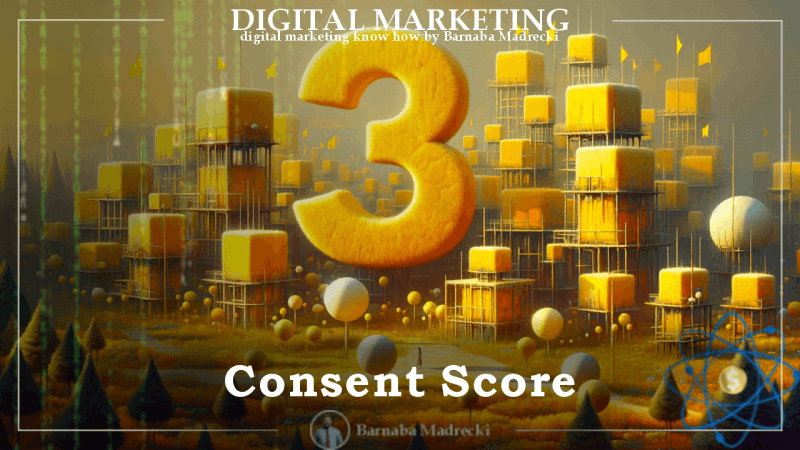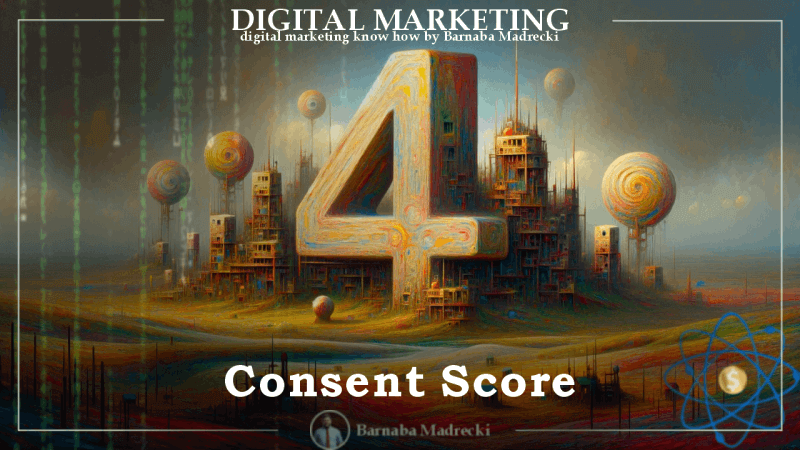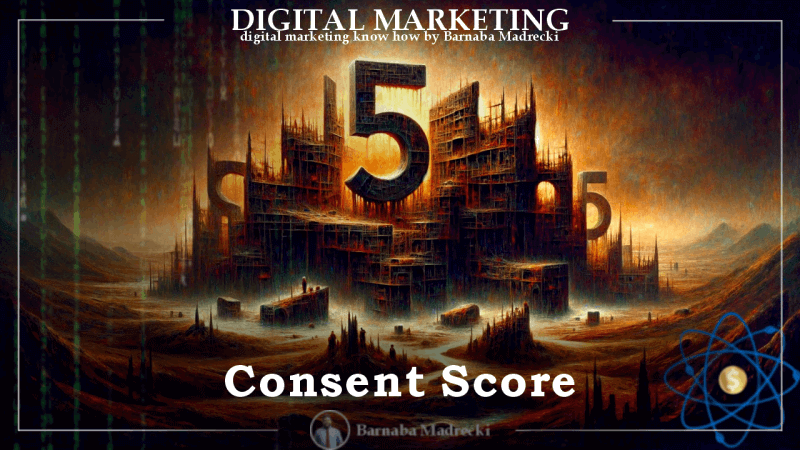
What is your Consent-Score?
And why it is so important now
Do you obtain consent for the use of cookies in full compliance with the law and Google's requirements?
The field of consent for cookies is complex. It touches both technical (javascript, browser memory, website tagging) and legal issues (Polish and EU regulations, google terms and conditions). Let's be honest - none of these areas is what business (and website) owners like the most. That is why, above all for my Google Ads clients, I write down the most important facts and introduce the Consent-Score. The Consent-Score is an easy-to-understand measure of where your site is in terms of compliance and where you, as a site owner, want to be.
Responsibility of the site owner
It is the site owner's responsibility to ensure that the site operates legally. As a Google Ads professional, I want to make it easier for owners to meet the relevant conditions. The way in which information is implemented and consent to cookies is managed has a very strong impact on web analytics. It affects the measurability and the very results achieved by Google Ads.
There is a heavy financial penalty for using cookies in a user's browser without their consent. In theory.
To this date, there have been several convictions in Europe against website owners (I am not talking about the owners of advertising systems: Facebook, Google, Amazon, etc.). However, these judgments concerned very large entities (e.g. Carrefour) and were not cases in Poland.
Therefore, the situation is such that there are still many, many sites that do not have properly implemented systems for obtaining user consents. The situation may have continued without much change, but it is changing:
The Digital Markets Act, or if you don't use a bat, then... another bat
In a nutshell: The European Union has obliged companies such as Google and Meta (Facebook) to adapt their systems and force their users (i.e. you - Google Ads advertisers) to comply with EU regulations
(more: https://ec.europa.eu/commission/presscorner/detail/en/ip_23_4328).
As a result, you see a message like this on your Ads accounts:
So far I have not been able to get a clear idea of exactly how the system will act if you have not implemented a consent management system by March 2024.
At stake:
👉 no remarketing function (according to the content of the "yellow message");
👉 the impact on the measurement function , i.e. the (partial?) lack of traffic and conversion data on the website.
Consequences of the second bat
Does not meeting this requirement hurt? The lack of remarketing capabilities may affect the effectiveness of the campaign, although this would be 'survivable' (incidentally, remarketing will play a lesser role anyway due to restrictions in 3rd party cookies).
On the other hand, if measurement functions, i.e. reporting of conversions from Ads tags and/or Analytics, were blocked, I would call it armageddon. Since we have no binding information at this point, it is better not to risk armageddon and to implement a cookie consent management tool.
Consent-Score
Well, to the point. Where you are, and where you would like to be.

Consent-Score 1
👉 The banner shows with buttons: Accept, Decline, Settings
👉 Does not save cookies before consent is given
👉 Legality: 100%
👉 Google Ads remarketing available: full
👉 Google measurement functions available
👉 Negative impact on data volume in Analytics and Ads (due to lack of consent): large; from a few, a dozen, to even a few tens of percent of visitors will refuse to

Consent-Score 2
👉 The banner shows with buttons: Accept, Settings
👉 Does not save cookies before consent is given
👉 Legality: 95%
👉 Google Ads remarketing available: full
👉 Google measurement functions available
👉 Negative impact on data volume in Analytics and Ads (due to lack of consent): moderate; very few users enter settings to block cookies

Consent-Score 3
👉 The banner that looks so professional
👉 Saves cookies before you give your consent
👉 Legality: 10%
👉 Google Ads remarketing available: yes, but I wouldn't recommend circumventing the rules in this way
👉 Google measurement functions yes, but I wouldn't recommend circumventing the rules in this way
👉 Negative impact on data volume in Analytics and Ads (due to lack of consent): none

Consent-Score 4
👉 The information bar without selection option
👉 Saves cookies cookies are saved immediately
👉 Legality: 10%
👉 Google Ads remarketing available: no
👉 Google measurement functions can be restricted after 2024 03
👉 Negative impact on data volume in Analytics and Ads (due to lack of consent): none

Consent-Score 5
👉 No information about cookies
👉 Saves cookies cookies are saved immediately
👉 Legality: 0%
👉 Google Ads remarketing available: no
👉 Google measurement functions can be restricted after 2024 03
👉 Negative impact on data volume in Analytics and Ads (due to lack of consent): none
Option 2 is not 100% in line with the regulations, which say that refusal should be as easy as acceptance. In option B, go into the advanced settings of the cookie banner and uncheck/check the relevant options there.
Option 3 perhaps reduces the chance that someone will complain about the non-application of the message. Perhaps before a court of law some line of defence will be that "we wanted to implement the system but did not know it was not working properly". However, in my opinion this is a weak option. The only advantage I can see in it is to have a partially implemented system that, if anything, can be adapted to real requirements more quickly.
Option 4 is very common. Better than nothing. At least we make it known that we are using cookies. In contrast, we risk both legal consequences and not being able to use Google's remarketing or measurement functions at all.
Correct implementation of cookie consent
If your site does not have a Consent-Score of A or B, then I strongly encourage you to take action. As the digital marketing consultant I can very quickly and easily diagnose what Consent-Score your site currently has.
Implementing a consent management system, on the other hand, is labour intensive and can generate additional tool costs. Depending on the site/shop engine you are using (WordPress, WooCommerce, Presta, Shoper, dedicated solutions) and the implementation method of the analytics scripts used (various plug-ins on the site, Google Tag Manager, directly in the code), you need to take the appropriate implementation method. Sometimes compromises have to be made, e.g. we implement a given script (and cookie) in a different, less favourable way in order to comply with the law.
How a well-implemented cookie consent management system works:
👉 does not save cookies prior to consent (except where necessary);
👉 gives the option to use the website without cookie consent;
👉 it is integrated with Google Consent Mode, i.e. it makes it possible to send part of the data, not requiring cookies, to Google, through which Google models for us part of the lost data;
and somewhat less relevant from a functional point of view:
👉 presents information about the cookies used;
👉 stores consent statuses.
Summary
At this point, we do not know what consequences Google will face from sites without a cookie consent management system in place after March 2024. Most likely, remarketing will disappear. Additionally, it is highly possible that measurement functions in general, i.e. Ads conversion tags and Google Analytics data, will be reduced or disabled. This would certainly have a negative impact on the effectiveness of your business' Google Ads campaigns. It is better not to risk such a situation and implement a level A or B consent system. Especially as Polish and EU law requires it anyway.
